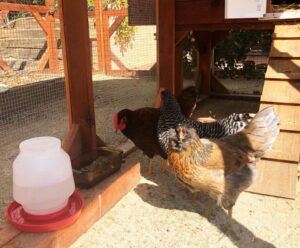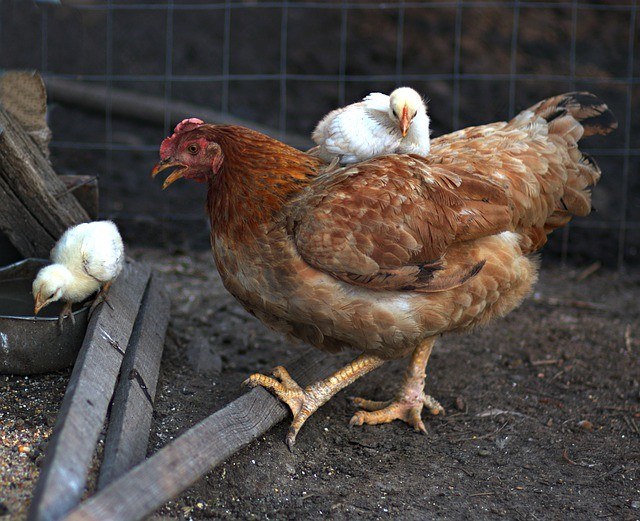It's not a secret that our lifestyle can have an impact on our world. This year we chose to live an even more sustainable lifestyle and adopted four chickens. Beyond gardening, raising chickens was our first step in becoming true homesteaders. So here I get to share my experience on how to raise chickens for beginners.
What are the Benefits of Raising Chickens?
No matter who you are, raising chickens has tremendous benefits.
First, they are pretty easy to maintain, especially compared to other types of pets. This is because you will be getting fresh eggs, saving you money at the market. Also, the eggs produced are fresh and taste better than eggs you buy because you control the foods the chickens eat.
You will be so surprised at how friendly and full of personality they are! I promise you'll get loads of laughs just watching them do their thing. And if you have kids, they love taking ownership and tending to chickens.
What Are the Best Breeds of Chickens?
I tried to find out just how many chicken breeds exist in the world, but it turns out, no one knows! Wikipedia estimates hundreds!
So choosing the type of chickens you want to raise may be more difficult than you thought. But of course you can mix it up and get different kinds. Each breed has its own advantages, and all breeds lay eggs, but the frequency and size will vary.
You may want to pay attention to certain breeds that need specific types of care. For example, Phoenix and Minorcas require heat. Chanteclers like cooler conditions. But don't worry, most varieties thrive in all climates.
The most important factor you should consider when choosing chicken breeds include:
- The breed's temperament
- Your climate
- The breed's noise level
- The breed's adaptability
- Quality, size and color of the eggs produced
The most popular breeds include:
- Jersey Giant
- Rhode Island Reds
- Barred Plymouth Rocks and Araucanas
- Bantam
How To Raise Chickens For Beginners
Start With Chicks Rather Than Eggs
Once you decide the breed you want to raise, you'll need to decide what stage of development you want the chicken to be. You can choose from eggs, baby chicks, pullet (teenage female) or mature adults.
Baby Hatching Chicks and Day-Old Chicks
If you want to raise and hatch your chickens from birth, you'll need some fertilized eggs and an incubator that you can buy online.
Day-old chicks are available from some farm suppliers or hatcheries. They're usually inexpensive, costing just a few bucks.
Luckily, all it takes to raise healthy chicks is starter food, clean water and a brooder pen that is draft-free. You also will need a brooder lamp to keep the temperature 92 degrees Fahrenheit.
If you're raising young chicks, the best brooder is a cardboard box lined with newspaper, pine shavings, and heat lamp.
When the baby chicks start to get their feathers, you can reduce the temperature by 5 degrees each week until they reach six weeks old. Then you want to switch their feed from starter feed to grower mash.
We decided to go with Pullets, and this was their size the day we brought them home from our local feed and grain store.
Pullets
A pullet is a hen under one year old that has not started laying eggs yet.
I recommend starting with baby chicks or pullets rather than eggs because you can better influence their health right from the start.
If you get chickens older than 2 months old, you can place them directly into an outdoor chicken coop.
Chicks and pullets are still very delicate and you'll need to wait at least six months for eggs. We got our flock of four pullets about a week before Christmas and expect eggs by spring. It usually takes about 20 weeks for them to start laying eggs.
Mature Hens
Mature-laying hens are harder to find unless someone offers you their hen. Chances are you'll have a hard time tracking one down, but if you can you'll have eggs much sooner!
Now let’s take a look at what your chicken coop should be like for chickens that are ready to start laying eggs.
What Makes a Good Chicken Coop?
If your chickens are older than two months, you can put them directly in an outdoor chicken coop. There are so many different designs available to purchase or build yourself.
When choosing your coop, make sure to consider these factors before making your final decision.
Nesting box

Your chickens will need a place to lay their eggs and a nesting box makes laying and collecting eggs much easier. Make sure your coop has one before you buy. You will need one nest box for every three hens in your flock.
Security
Once your chickens free-range outside, they are going to be exposed to a variety of predators. So, you need to make sure your coop is fully covered by a wire cage and strong enough to ward off potential intruders.
Room to Spread Their Wings
Your hens need space to move around, exercise, and get fresh air. When measuring out your coop, leave at least 2 square feet for each chicken. They need room to spread their wings.
A four-foot chicken coop will generally give them enough room for up to three chickens to roam around and stay healthy. Use this as a base point and choose a chicken coop that's big enough for all your chickens.
Overcrowding is what leads to feather picking and disease.
Many of the sources I researched say that you can’t keep chickens of different ages in the same coop. Yet, older hens rarely pick on younger hens when there is enough space to move around and good coop conditions.
What Temperature Do Chickens Like?
Chickens enjoy modest temperatures, but their feathers will keep them warm in the winter. Air circulation is also important, so be sure to have openings for good ventilation.

How Should You Care For Your Chickens?
Chickens are happy as long as they have a healthy place to live. They entertain themselves all day long picking at grass, worms, and beetles to make the tasty eggs you are waiting for!
Food and Water
You'll want to have a chicken water feeder waterer and a feed trough. Young chicks need to have clean water and food at all times, so keep it available always. Water should be changed frequently, especially if it's warm outside. Chicks can drown, so keep water bowls shallow. We tried a few different water systems but found this one to be the best in terms of keeping their water clean longer and easy to use.
Wood or Pine Straw Shavings
You'll also want wood or pine or straw shavings on the bottom the coop and in the next boxes. Your best bet is to line pine shavings on the floor, cover it with newspaper and scatter food over that.
Pens and Coops
Circular pens will help prevent chicks from congregating in a small corner, or you can use cardboard in the corners to make wider angles.
Chicken coops do not have to be elaborate. Just remember to keep the good practices mentioned above in mind, as you want your chickens to be healthy and happy.
It takes a lot out of a hen to lay an egg! This is why their chicken pellets need the right balance of protein, minerals and energy.
Your chickens should have access to these pellets at all times.
But, pellets are not the only thing that your chickens should eat. They need a varied diet to stay healthy and strong. Table scraps are great for chickens as are slightly softened vegetables, coffee grinds, stale toast and raisins.
Chickens are carnivores, and they will eat practically anything. The only types of food you cannot give to them are listed below. They are toxic to chickens.
- Bad or rotten food
- Chocolate or sugary candy
- Citrus
- Green potato skins
- The pit and peel of an avocado
- Raw or dried beans
- Green tomatoes
Hens will also need extra calcium, so aim for oyster shells or egg shells.
Chickens are carnivores, and they will eat practically anything. The only type of food you cannot give to them is avocados because they are toxic. If possible, let your chickens free range, as they will find their own food and vary their diet.
Keep in mind that during the cold winters, you’ll have to supplement the diet, and if you keep a chicken coop, you’ll need to add table scraps regularly.
What the chickens don’t want, they will shred. You can then add these shreds to a compost pile.
Give Chickens a Break From Laying Eggs
Related Content:


